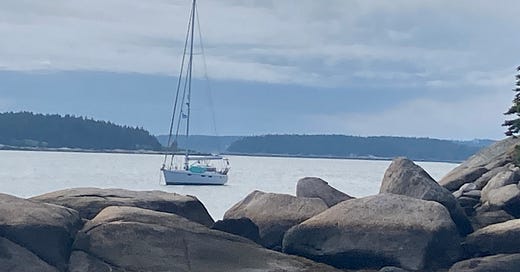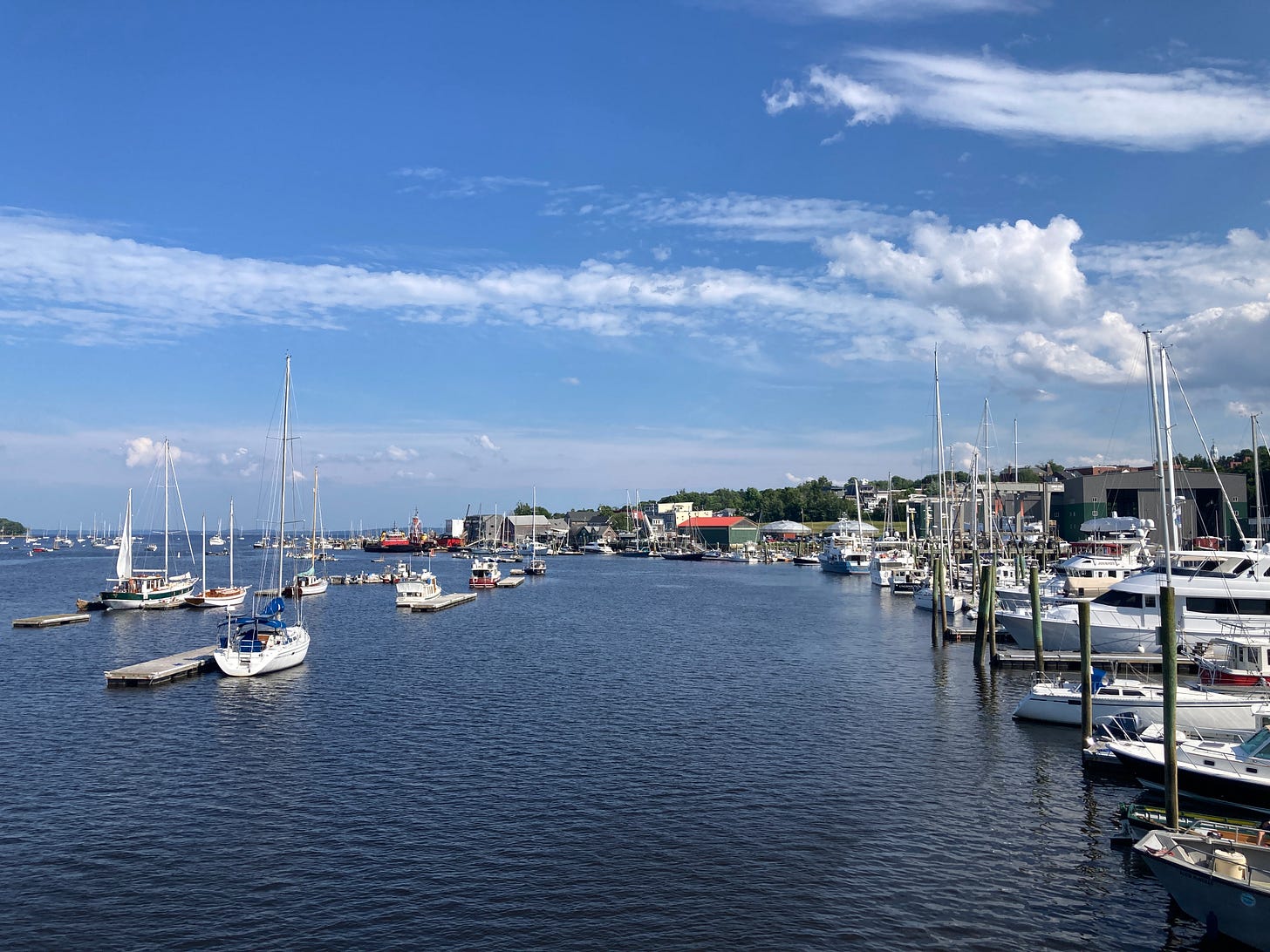July 14, Rockland Harbor: Casco Bay to Rockland was the first real trial by lobster pot. I survived, and never hooked a one. But the density of pots requires a constant lookout, and course adjustments every few minutes. When you are alone that means you get no breaks, and can’t even disappear below for more than a few minutes of a time.
It is wearing, and by the time I arrived at Burnt Island, southwest of Rockland after 6 hours of very light and rolly conditions, I was desperate to get an anchor down and be released from the oppressive vigilance. So I wasn’t thrilled to make the turn into the anchorage and see a veritable carpet of colorful pots covering just about the entire surface of the anchorage. I was sunburnt and exhausted. The complete and wanton elevation of the lobster industry over every other water-related interest now made me very…annoyed.
At first I thought I would have to go find another place to drop the hook, as unappealing as that idea was. But instead I decided to resist this brazen and merciless colonization of an entire anchorage. I slalomed my way in towards the beach and found a tiny patch of open water and let the anchor splash. I fell back as far as I could go without wrapping any pots around my prop or rudder and made the anchor fast. It held, as it usually does (love that anchor). I swung this way and that just missing the pots all around me (and not caring, to be honest if I ran over one or two). Good enough for a night.
As the boat settled, I doused my lobster pot fulminations with some cold beer. But I realized I needed to go about things a bit differently going forward. A single day had taught me that singlehanding in the land of lobster pots added a lot of challenge and stress, and required that I do as much advance setup as possible—preparing the mainsail and halyard for hoisting, and securing everything above and below decks—before getting underway. When you can barely leave the helm you have to have your sh*t correct and in order.
I also tried to shift my mindset and treat lobster pots as an annoyance similar to abundant mosquitos. They are just there, and you do what you can to minimize your vulnerability and suffering. I did wonder, though, how many boaters Maine might be losing to a single industry that seems relatively unconstrained in its exploitation of so much water. Lobster pot hassles are a defining element to Maine cruising, and if the islands and coast weren’t so beautiful, they would be pretty close to a dealbreaker.
July 15, Rockland Harbor. I’m on a Safe Harbor Rockland mooring. Safe Harbor is a brand (backed by private equity, I presume) that is buying up just about every leading marina on the East Coast. They are the Borg of the waterfront—”We will assimilate you.” Ordinarily, I don’t like the idea of a single entity owning so many marinas, or anything. But to Safe Harbor’s credit, they generally maintain the marinas they buy at a high standard (though many local boaters complain that the quality of marine service suffers with Safe Harbor ownership).
Safe Harbor Rockland is exemplary: for a $55 a night mooring ball you get access to super-nice showers, a laundry room with free machines (very rare), and two courtesy SUVs that you can use for a few hours at a time. All the marina staff are notably friendly and helpful. And the dock office will happily receive packages on your behalf.
I took full advantage of all amenities, especially the last one (package depot). When you are a sailing gypsy with no fixed address, it can be hard to get ahold of spare parts and other necessities. Knowing well in advance that I would be at Safe Harbor Rockland, I got a little trigger happy and buried the small dock office in fuel and oil filters, West System epoxy, and, most urgently, replacement parts for the leaky throne.
The receipt of toilet spares naturally led to another morning elbow deep in dripping sewage. But with alot of effort and cursing, I managed to rebuild the toilet and, miracle of miracles, it seems to work fine again. One of life’s little triumphs.
July 16-20: General Maine cruising. Nothing particular to note, other than the seawater is way warmer than I remember (so swimming is actually pleasant), and the abundance of great anchorages and harbors and towns really does make Maine a cruising wonderland. It is unique. And awesome. Except for the f*cking lobster pots.
And there is no shortage of beautiful boats that are well-sailed. Like this singlehanded showoff, who burned through Pulpit Harbor.
Of Note:
Maine lobstermen and the Maine lobster industry have long claimed there is no firm evidence that any whale has been entangled in Maine lobster gear. It was always a ridiculous claim, but they can now no longer make it:
A juvenile endangered North Atlantic right whale carcass washed ashore last month in Martha’s Vineyard, in the US state of Massachusetts. The event provided undeniable proof that Maine’s lobster fishery gear is involved in entanglements that, along with boat strikes, is the primary threat to the survival of the beleaguered population.
Do you think NOAA, and all its forecasting and research, is helpful and important? Project 2025 and Trump-world doesn’t agree:
Project 2025—a nearly 900-page book of policy proposals published by the conservative think tank the Heritage Foundation—states that an incoming administration should all but dissolve the National Oceanic and Atmospheric Administration, under which the National Weather Service operates. Donald Trump has attempted to distance himself from Project 2025, but given that it was largely written by veterans of his first administration, the document is widely seen as a blueprint for a second Trump term.
NOAA “should be dismantled and many of its functions eliminated, sent to other agencies, privatized, or placed under the control of states and territories,” Project 2025 reads.
3. The below is not an example of (per lots of social media) an “angry whale.” What it is an example of is a humpback whale lunge feeding and having the bad luck to find a small boat in its landing spot. Which is a reflection of the fact that humans (and fishing) continue to crowd into every habitat, especially the coastal Atlantic habitat. Between recreational fishing, industrial fishing, lobstering, and even whale watching, whales don’t get much alone time anymore. Maybe they should be angry.
If you liked this post from Sailing Into The Anthropocene, why not subscribe here (free!), and/or hit that share button below? You can also find me on Instagram and Twitter.









I'm preggo and hunkered down, and your missives from the waves are giving me LIFE right now, Tim. Really appreciative of your updates + insights!!
Good stuff. Also, the bottom is riddled with lost cages and lines we don't even see . . . none of which they're required to retrieve. Don't dare call them lobster farmers, either, despite the fact that I doubt their fishery would support the catch without the tons of bait they're fed . . . seems like aquaculture to me. They bristle at the oyster farmer who gets a small lease and is required to post a big cash bond with the state to fund removal of their equipment if it fails or sinks . . . but the lobster guys? Hell no! I love my lobster, too, and give them their due . . . but the water is warming and they're going to need to learn to grow oysters and kelp as the lobsters head north.